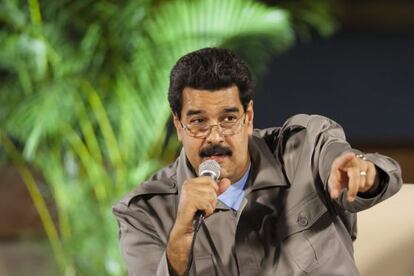Venezuela’s “camouflaged” currency devaluation sees Spanish firms lose out
Telefónica has reported losing some €4.3 billion from successive bolivar rate drops

Spanish companies operating in Venezuela are expected to take a painful hit to their finances following the government’s move on Monday to introduce a free-floating currency exchange system, which began selling dollars eight times higher than the official rate.
Telefónica could stand to lose as much as €1.5 billion, according to preliminary estimates. Also expected to incur big losses with the new forex system are bank BBVA and insurer Mapfre, which all have affiliates in the South American nation.
The government of President Nicolás Maduro said it decided to begin offering dollars through the new system in an effort to curb the demand on a growing black market. The Venezuelan Central Bank (BCV) fixed the exchange rate at 51.86 bolivars to the dollar on the opening day.
The move is being seen as disguised depreciation of 88 percent from the official exchange rate of 6.3 bolivars to the dollar, which still remains intact for most Venezuelans, and a 78-percent drop from the preferential rate of 11.36 bolivars introduced in January for pre-approved business owners and importers through tight restrictions.
Businesses will face fewer restrictions for purchasing dollars, but will have to pay a lot more for the currency
Under this new supply-and-demand system, known as Sicad-2, individuals and businesses will face fewer restrictions for purchasing dollars, but will have to pay a lot more for the currency.
Although not seen by the government as an official devaluation, many analysts said the new rate is an accurate reflection of what the bolivar is actually worth in global currency markets.
With President Hugo Chávez ailing before his death last year from cancer, Maduro assumed economic powers and devalued the Venezuelan currency 32 percent: from 4.3 to 6.3 bolivars to the dollar. Since then, he has instituted a series of measures that have become camouflaged devaluations through Sicad systems.
Over the last four years, Telefónica has lost some €4.6 billion due to successive devaluations of the Venezuelan bolivar, company officials have said. The telecoms giant is also expected to take another €1.8-billion hit from the first Sicad, which was introduced in January.
It is not known how much Mapfre may lose. Last year, Venezuela was the Spanish insurer’s second-largest market in sales of premiums and controlled 6.9-percent of the local market.
BBVA controls 55 percent of Venezuela’s Banco Provincial, whose net worth on its books is about €493 million.
Spanish oil giant Repsol has significant operations in Venezuela, but because dollars are used for transactions in the petroleum industry, the impact is expected to be negligible.
Tu suscripción se está usando en otro dispositivo
¿Quieres añadir otro usuario a tu suscripción?
Si continúas leyendo en este dispositivo, no se podrá leer en el otro.
FlechaTu suscripción se está usando en otro dispositivo y solo puedes acceder a EL PAÍS desde un dispositivo a la vez.
Si quieres compartir tu cuenta, cambia tu suscripción a la modalidad Premium, así podrás añadir otro usuario. Cada uno accederá con su propia cuenta de email, lo que os permitirá personalizar vuestra experiencia en EL PAÍS.
¿Tienes una suscripción de empresa? Accede aquí para contratar más cuentas.
En el caso de no saber quién está usando tu cuenta, te recomendamos cambiar tu contraseña aquí.
Si decides continuar compartiendo tu cuenta, este mensaje se mostrará en tu dispositivo y en el de la otra persona que está usando tu cuenta de forma indefinida, afectando a tu experiencia de lectura. Puedes consultar aquí los términos y condiciones de la suscripción digital.








































